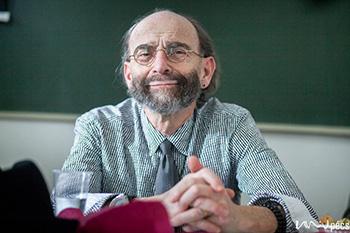Social Work Professor Keynote Speaker at International Social Work Conference

“If too many of you fall asleep, I will stop talking and leave the podium. In fact, if you close your eyes I will take that to mean that you are letting me know that I should end my presentation immediately” joked Associate Professor Dr. Tomi Gomory, in his keynote address at an international conference held April 7-8, 2017. The event celebrated the 650th birthday of the University of Pécs in Hungary and the 25th anniversary of the launch of the University's Social Work Department (now known as the Department of Community and Social Studies) at the Faculty of Humanities.
The conference drew more than 200 participants. Peter Csizi, a member of Hungary’s Parliament, and Vice Provost of the University of Pécs, Dr. László Jankovits, greeted and welcomed participants and presenters.
Dr. Gomory laughingly noted in his Hungarian language address that his Hungarian vocabulary was on par with that of a 9-year-old child, so the audience wouldn’t have to endure too many highfalutin academic notions in his talk. Born in Debrecen, Hungary, Dr. Gomory emigrated at the age of 9 to America in 1956 during the Hungarian Revolution and returned in 2005 as a Fulbright Scholar at the University of Pecs researching mental health and homelessness.
Beyond the humor in his keynote address, Dr. Gomory’s serious message was that in order to do the best possible educational work a caring college teacher and student relationship is essential and should be based on the ongoing attentive listening of each to the other and the critically engaged back and forth corrective feedback produced in such dialogue.
A Reference in his talk to the Hungarian tradition of calling students “listeners” (“hallgatók”) illustrated some pedagogical challenges for Hungarian higher education. By assuming that students are just listeners that pedagogical presumption creates a hierarchy of professors “professing” and students simply listening and memorizing “facts” not critically engaging around the material. Dr. Gomory illustrated his approach to active engagement in his talk. He consistently peppered his talk with questions to the audience, patiently encouraging and soliciting the audience members to comment and offer their opinions on his presentation. This new to the Hungarian audience approach to creating a collaborative event started haltingly but over the course of the talk that awkwardness shifted as the audience understood that their participation was necessary into an enthusiastic interactive experience. By its conclusion, his address both entertained and educated the audience.
Dr. Gomory has visited the Department of Community and Social Services at the University of Pécs regularly since his initial 2005 visit as a Fulbright Scholar. He formed strong friendships and research alliances with several members of the department’s faculty during that stay. These contacts he has maintained through subsequent research efforts and visits.
He is currently working to integrate two important well-tested approaches for improving expert skills, Deliberate Practice and Feedback Informed Treatment into clinical social work practice in Hungary as well as here at our College. These collaborations in mental health, homelessness, and social work education are to be continued and expanded through future planned visits and research.
Presentations by Dr. Zuszsa Kaló of Eötvös Loránd University, Budapest and Dr. Csanád Alber-Lörinc of Partium Christian University, Romania followed Gomory's keynote address. The rest of the two-day conference consisted of breakout sessions on a variety of important social work issues.
Dr. Gomory also chaired the initial breakout session on addiction and clinical social work. Four other breakouts focused on the topics of child protection, school social work, regional development/social economy, and community development/community values.
“I am always pleased to be back in Hungary, a beautiful place with many dear friends and colleagues," Dr. Gomory said. "This latest trip was mixed with melancholy due to the strong political turn toward authoritarianism and intolerance by the regime in power, unfortunately too reminiscent of the Fascism in Hungarian politics during the 1920s and 1930s and echoed throughout the world more recently.”
